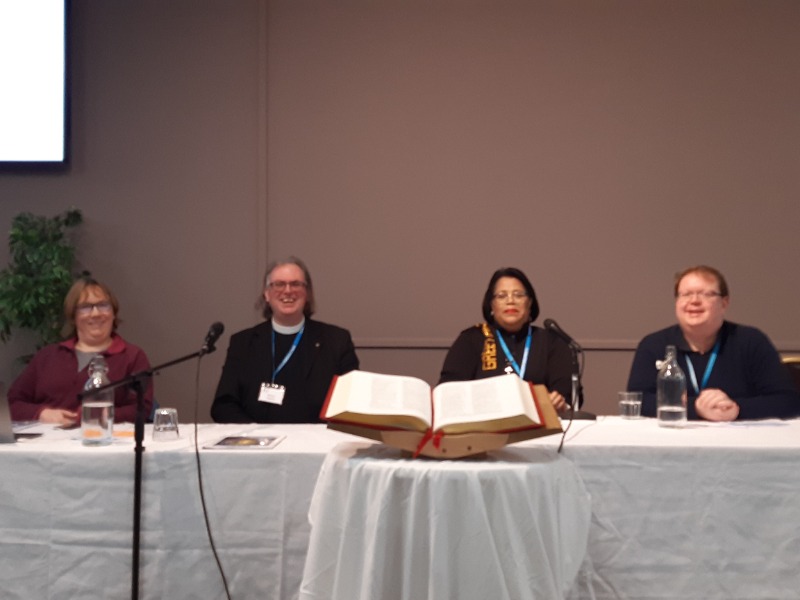The 2024 meeting of the United Reformed Church (URC) Assembly Executive took place at from 9-11 February at The Hayes Conference Centre in Swanwick, and was opened by the Revd Dr Tessa Henry Robinson, Moderator of the URC General Assembly 2023-2024.
The Moderator also welcomed members into new roles and new members of Assembly Executive attending for the first time.
Day one
Session one
Karen Campbell and the Revd Stephen Anso-Adda, the Moderator’s chaplains, led lively worship, including hymns, prayer and poetry. Stephen sang “The Impossible Dream”.
He read the story of Samuel’s call by God from 1 Samuel 3, and Daniel Raddings read from 1 Corinthians 1 and 3 about the foolishness of God.
Karen preached, noting that Samuel was not an obvious person to bring God’s word, as he did not even know the Lord. At Assembly Executive, she said, there are some voices we turn off and others we find it easy to attend to.
Who do we give attention to? she asked. Who do we filter out? Who do we hear and who do we ignore? How do we know which voices are God’s? Karen quoted Tessa as saying: “Listening is pastoral and can be life-saving.” Are we ready to hear God’s voice? Karen asked. “Speak, Lord, your servant is listening. But are we?”
The session concluded with a short opportunity for members of Assembly Executive to introduce themselves to each other.
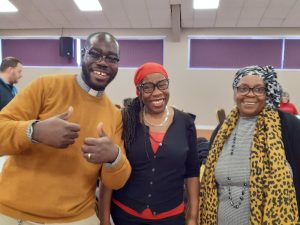
Session two
Update from Finance on budget progress
Alan Yates, URC Treasurer, gave a verbal update about the work done following the Assembly Executive Budget meeting which took place by Zoom on 28 November 2023.
In recent years, Alan reminded the Assembly Executive, meeting at the Hayes Conference Centre, Swanwick, that the Ministry and Mission (MoM) fund deficit has been increasing. At the meeting in November, Assembly Executive agreed that this was unsustainable, and it asked the Finance Committee to eliminate the deficit over the next five-seven years.
The consultations that have taken place since, Alan continued, have been done with grace. And he shared that in 2023, the Synods had given £1.9m to ‘top up’ the MoM fund. “Without that support, the fund would have been in deficit of £3m last year, and I thank the Synods for their generosity.”
Since November, the work has started to inform policies and tasks going forward, and included meetings with Synod Moderators, the Resource Sharing Task Group (RSTG) Convenor and Secretary, the General Secretariat, Synod Treasurers and representatives from Synod Trusts.
There is now a proposition, Alan continued, which might not be easy but has been described as sensible. “The URC can balance the MoM budget in seven years if receipts are kept at 2023 actuals, and, at the same time, reductions in expenditure by Assembly Committees and Church House of between 5% and 3% each year is achieved.”
The lion’s share might come from the sale of redundant buildings, but this is unpredictable.
To aid the process, the RSTG has agreed to help Synods unable to meet their target in any particular year.
Meetings with URC Committee convenors and secretaries will now take place.
Alan finished: “This is just a plan – the plan will need to respond to significant changes, and can be amended, remembering that at the November meeting, 20% of the vote was for a growth plan.”
H1 Ministries: URC Comptency Process
The Revd Mary Thomas presented Paper H1, which takes a pastoral approach in handling concerns around a minister’s performance so as to assist them to improve performance of their duties.
Mary advised Assembly Executive that this new process arose from responses from those who have had to implement the previous URC Capability Process, agreed at General Assembly 2020. They felt that process was similar to a disciplinary process and was not helpful.
Mary explained how the process of discernment (an inner sense of Call alongside external discernment) is a process that continues throughout Ministers’ work in various posts through the use of the Marks of the Ministry for Ministers of Word and Sacraments and Core Competencies for Church Related Community Workers.
Ministers are not expected to demonstrate gifts in all areas, so they are supported throughout their years of ministry to grow in recognition and self-awareness of what learning could enhance their practice and what tools could equip them.
Sometimes, Mary explained, the performance of a minister may fall short, and if this does not fall under a disability as defined under the Equality Act 2010, the revised Competency Process can be used to assist the minister and the relevant council of the church.
“It is hoped that this process, which mirrors that of the Amber Light process used by our RCLs, might achieve an improved working life for the minister and help them to flourish in their post,” Mary said.
“It also allows for the fact that this may not be possible and outlines how the relevant council of the church may seek to move the minister to inactive status.”
The resolution was then put to Assembly Executive and was carried unanimously.
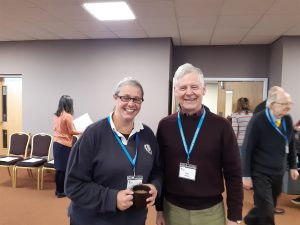
Day two
Session four
R1 CDAG: Investigations Team
The Revd Adrian Bulley, Deputy General Secretary (Discipleship) presented this paper, with amended wording, on behalf of the Complaints and Discipline Advisory Group.
The proposal aims to speed up the investigation of disciplinary complaints against Minsters by using HR professionals in place of volunteers from the URC.
The disciplinary process, Adrian said, has a voracious appetite for people and their time. It has faced unprecedented demands since 2022, with nine teams investigating cases over 16 months. The use of volunteers, who are already stretched, makes it an especially long process, leaving ministers in limbo.
Adrian said that the HR company to be used was one that the General Secretariat has used before and been impressed by. The investigation would also supported by a person steeped in the culture of church.
The hope is that this change would speed up the procedure from months to weeks.
A short discussion followed, including a question about ensuring making appointments representative. Adrian said this would be up to the general secretariat. The General Secretary, the Revd Dr John Bradbury, added that this is fact-finding operation in between two larger decision-making panels, which are representative.
The resolution was passed.
R3 CDAG Assembly mandated matters
The Revd Adrian Bulley presented Paper R3 on behalf of the Ministries Committee and Complaints & Disciplinary Advisory Group.
The aim of the resolutions in the paper is to provide a streamlined process in dealing with ministers who refuse to engage in Assembly Mandated Matters.
These matters currently include safeguarding training, safer sacred space training, anti-racism training, and pastoral supervision.
Adrian explained that most ministers comply with the mandates and recognise that it can benefit their ministries, however on rare occasions, some refuse to.
In those cases, an agreed process is needed for ensuring compliance and responding to persistent non-compliance. Paper R3 proposes a way forward within the ministerial disciplinary process for dealing with this.
The proposed process includes:
1. Ministers’ awareness of what’s required of them.
2. A “Moderator’s Recorded Warning” being issued by the synod moderator where a minister fails to comply within a reasonable time frame. This is a provision which already exists within the “Section O” process – and includes a deadline for compliance.
3. A referral will be made by the Secretary for Ministries to the Assembly Standing Panel for Discipline (ASPD) where a minister has not complied by that deadline.
Adrian explained that at this point, the process diverges from the standard process in that an Investigation Team is not set up on the basis that the timeline and the evidence provided by the Secretary for Ministries, alongside any comments or mitigation supplied by the minister, is thought to be sufficient for the ASPD to decide what action to take.
4. the ASPD might decide to issue an agreed caution, with further time for compliance.
5. the ASPD may decide to refer the issue to an Assembly Commission for Discipline, with provision in this paper that the same Commission might hear several parallel cases, or
6. the ASPD can then use any of the sanctions outlined in the process (written curtailment or deletion).
In short, this process honours the ministerial discipline process, but makes use of a slightly abbreviated version in these specific circumstances.
A comment from the floor, centred on the length of time procedures would take once the process arrives at point three. It was clarified that it should be a relatively quick process.
The resolution was then carried.
Paper H2 Ministries: Special Category Ministry
The Special Category Ministry Scheme (SCM) was first introduced in the 1970s.
Following a review of the scheme, initiated by the Church Life Review, the Ministries Committee had concluded that the time was right to re-think the scheme. SCM projects have worked on the ‘frontiers’ of industry or education, in the face of social injustice and in other parts of the URC. The committee proposed transitioning to a scheme of 13 new pioneering posts (one per synod) focused on growing new Christian communities. They emphasised that the posts would need to be part of a synod’s mission strategy, and that they would be aimed at people who do not know the gospel and are not currently involved with an existing church. The new proposals would mean a reduction of posts beyond pastorate ministry, though she confirmed that all current SCM post holders would continue to the end of their present term.
In response to one questioner, the Secretary of the committee said that evaluation of SCM ministries has been difficult to undertake, but added that the accreditation sub-committee could offer further information in due course.
To a question from a chaplain passionate about ‘liminal ministries’, the Secretary offered reassurance that the committee is fully aware it needs to be better at supporting chaplaincy – it has already been time-tabled for detailed discussion at upcoming meetings.
In discussion, one delegate said a maximum of 12 years for a pioneering post is not enough to establish a self-sustaining new church. A synod moderator was concerned that the definition of pioneering ministry was more restrictive than that of SCMs. He was also concerned that the new role was being targeted primarily at ordained ministers of Word and Sacrament, and felt lay people could be usefully employed in the new roles. Another minister said there are more ways of being the Body of Christ than growing new communities – it is also important to be within communities, she said (and what another speaker called a ‘ministry of presence’).
Pioneering is ‘not everything everywhere all at once,’ said a hospital chaplain. She also felt the concerns raised by SCM ministries are not being addressed in the new pioneering posts. She said the resolution being proposed closed doors to other opportunities and moved that the resolution ‘be not put’ – a procedure that requires two-thirds majority to pass. On a vote, only 62% voted for the resolution to be not put, so time was given for further discussion.
One speaker referred delegates back to an Assembly Report that laid out the numbers of churches that are closing and said the time has come to be intentional about growing new Christian communities.
The Convenor said that many people were waiting on the outcome of the Resolution and welcomed the proposal that the resolution be remitted to a facilitation group.
This was agreed.
Returning to Resolution H2, Peter Knowles, for the Facilitation Group, said they had worked to retain the clarity of the original proposal – to move from SCM to pioneering ministry – while developing wording that was more respectful of the variety of possible ministries, including chaplaincy, and open to further opportunities. A new clause was proposed affirming liminal ministries, both lay and ordained, and requesting Ministries and Mission Committees to consider how such ministries might be supported and developed, returning to Assembly Executive in February 2025 with a report and proposals.
There was also a suggestion that the resolution be not so prescriptive about the nature of the work undertaken by the 13 new pioneering posts. There was some disagreement about whether pioneering ministry should be solely about ‘growing new Christian communities’. One SCM said there is a tension in going into a context ‘with a goal’ – the definition of community should be held lightly. In response to a question about whether more than 13 appointments might be made should this scheme be successful, the Ministries Secretary said yes, absolutely. In a passionate statement, she said this is a pivotal moment in the life of the Church and a time to take risks. The General Secretary suggested that, as a Church, the URC is ‘nervous’ about evangelism – ‘it’s not quite in our DNA as other marks of mission’; but that this resolution is a tentative step towards proclaiming the kingdom of God through evangelism.
The resolution was carried overwhelmingly, including the new clause and retaining the definition of pioneering ministry as ‘growing new Christian communities’
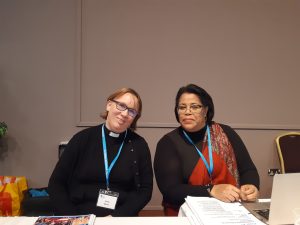
Session five
A1 Business Committee: Establish the Resources Committee
Victoria James, Chief Operating Officer, presented a proposal for a new Resources Committee that will consolidate the work of five existing committees: Finance, Church House Management, Human Resources Advisory Group, Remuneration and Communications. Victoria said that this proposal would help reduce duplication of some tasks; improve collaboration and streamline workflow.
It was proposed that the Remuneration Committee be retained as a separate sub-committee – preserving confidentiality around sensitive personal information; maintaining a distinction between staff remuneration conversations and those managing finances; and more easily enabling external input as required.
Approving the revised terms of reference would allow for the final working arrangements to be brought to General Assembly later in the year. ~
The resolution was passed unanimously.
A2 Business Committee: Modern Slavery Statement
Assembly Executive adopted a statement on Modern Slavery for local churches, Synods, and staff and officers at United Reformed Church House to develop and adopt. This work followed a resolution brought by the West Midlands Synod to General Assembly in 2021.
Synods and local churches are now encouraged to develop policies which support the Modern Slavery statement and to deliver its expectations.
It further noted commitment from staff and officers at Church House to implement a Modern Slavery Policy, and to revise other policies in response to this statement while also implementing procedures to underpin the policy and the statement.
Victoria James, Chief Operating Officer, said that this paper represented a collaborative piece of work after significant consultation, the bulk of which was undertaken by the safeguarding team and the Head of Compliance and Services, Mary Fallah.
The statement is designed to set out stance as a denomination on modern slavery and human trafficking. While it represents a significant amount of work, its just the start, requiring us all in the URC to be constantly vigilant.
Russell Furley-Smith asked for clarity about the decision-making councils of the Church, and Pippa Hodgson wondered if a central policy could be provided.
Rita Griffiths, Mersey Synod, asked for a template for policies for churches and Synods to use, and John Bradbury, General Secretary, said that a pro-forma policy would be produced if the statement was passed.
Geoff Felton endorsed the paper saying that that it will change people’s minds. “Modern day slavery is a scourge on society, and we need this statement to help churches tackle it.”
Catriona Wheeler said that some areas, especially rural areas, have higher instances of modern slavery and that churches need to look closely at all who work for them.
After a couple of minor amendments for clarity, the statement was adopted.
Read the unamended statement. The amended statement will be included in the minutes of the meeting.
I1 Mission: Report
Sarah Lane Cawte, Convenor of the Mission Committee, presented a report on its recent work. She highlighted a number of areas of the report: Simeon Mitchell, Secretary for Church and Society, moving on to lead JPIT from within the Methodist Church; Israel and the Occupied Palestinian Territories, on which the committee will bring a resolution to General Assembly; the anti-racism training programme, of which the first two sessions have taken place; ecumenical work; and the URC’s partnership with Greenbelt festival.
Sarah invited members of Assembly Executive to discuss the report in their groups.
Session six
Free time
Session seven
F1 Worship, Faith & Order: Update
An update from the Worship, Faith and Order Committee was shared at Assembly Executive.
In the past year it has:
- discussed its ‘environmental policy’
- completed work on a Fresh Expressions paper which helped inform debates elsewhere in the church about when a FX becomes a ‘church’
- continued a discussion about membership and ‘isolated membership’,
- prepared and discussed a paper on the theological implications of the Vocation and Call paper
- looked at and responded to the material presented by yoURChurch, the digital church which was adopted as a new URC Congregation at General Assembly last year
- began a discussion about how the schedule of promises might be made available in non-gendered language
- looked at a paper on ‘Theology of Safeguarding’
- looked again at the ‘priesthood of all believers’
- supported the arrangements made for a 20s-40s event
- consulted work out how Children’s and Youth Work Ministry might be formally recognised in the URC, highlighting what might be the F&O issues involved.
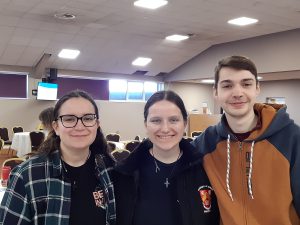
The following resolutions were passed en bloc. En bloc resolutions are voted on without debate, having been deemed uncontroversial. This was no reflection on their importance. Read the full reports and resolutions in each case here:
A4 – General Secretariat Transitions
Extending the term of the Revd Philip Brooks as Deputy General Secretary (Mission) until the end of August 2025.
A5 – Business Committee: minutes secretary
Appointing Morag McLintock and the Revd Andy Braunston jointly to share the role of Minutes Secretary at General Assembly and Assembly Executive, on the retirement of the Revd Ken Forbes.
F2 – Worship, Faith and Order Committee: amending terms of office
Changing the term of service on the Worship, Faith, and Order Committee to four years, with the possibility of one further four-year term of service, in line with other committees.
G1 – Pensions Update
A report on the progress of new working arrangements for the Pensions Committee.
J1 – Nominations Committee
New appointments to Assembly committees.
R2 – Ministerial resignations
Clarification of the rule that accused ministers may not resign from the Roll of Ministers once a disciplinary case has started.
X1 – Mersey and North Western Synods: synod changes
Transferring Wilmslow United Reformed Church from the North Western Synod into Mersey Synod.
Paper Z2: Principal of Westminster College
The Revd Dr Peter McEnhill has been appointed Principal of Westminster College. Dr McEnhill is a minister of the Church of Scotland, with wide ecumenical, administrative and academic experience. He will take up the post in July 2024. Grateful thanks were offered to the Revd Dr Robert Pope, who has served as interim principal since the end of 2021.
Paper S1 URC roles eligible for a criminal record check
Roger Jones, on behalf of the Safeguarding Committee, brought this proposal to update the matrix of roles eligible for disclosure and barring scheme checks.
Knotty discussion followed, touching on the role of interim moderator, youth representatives and the relationship between Church and Trust relationships. The General Secretary, the Revd Dr John Bradbury, warned that the latter area was immensely complicated. ‘Very little has addled my brain so much as these questions in the last few years,’ he said.
In response to discussion, Roger later brought revised proposals, adding boxes to the matrix to include synod youth representatives, and extra text to cover other roles. The committee agreed to do further work on the rules. The resolution was passed.

Church Life Review Update
John Bradbury, the URC General Secretary, gave an update about the Church Life Review (CLR) and the nominations for the new Church Life Review Task Groups, highlighting the feedback from the CLR webinar on January 24 (which can be watched on the URC YouTube channel).
The deadline for nominations was extended to March 4 to give people longer to respond to the call to serve.
However, the group reflected on how pressurised and tired people felt as shared at the webinar, and how much they are already carrying with a new and large piece of work, beyond what they feel they can take on.
John asked what could be done if the URC is at capacity, and that volunteers can’t take on any more? A lot of the CLR work is to try and lessen the load on members, but how do we get that work done which would take us to that place, John asked.
And if we don’t do that work, he said, the Church won’t be able to do the work Assembly has requested.
He asked the meeting if could some pieces of work be done professionally, using specialists or fixed term contract staff, with the same brief to widely consult the church?
Assembly Executive broke into groups to discuss this and in the plenary afterwards, suggested:
- secondment of Church House or Synod staff
- the use of consultants, which would get people together to talk but there was a lot of warmth that idea
- that the tasks be further sub-divided further
- staggering the work
- using the work from sister denominations for similar insights
- actively recruiting people who might not be at capacity and have the skills needed
- asking those with part-time roles to consider longer hours.
John concluded that he had heard an openness to work that diverted from what the General Assembly had agreed, and later in the meeting, brought the following enabling resolution, which was agreed:
“Assembly Executive authorises the Business Committee, if necessary, to find alternative ways to forward the work envisaged to be undertaken by the Church Life Review Task Groups determined by resolution at General Assembly 2023 within the ethos of the United Reformed Church.”
Paper A3 Business Committee: Reconciliation & Mediation Service
The Revd Adrian Bulley, Deputy General Secretary (Discipleship) explained that he has had fruitful conversations with a number of people and each of those has contributed in some way to paper A3.
The culmination of these conversations is, he believes, the need for a denomination-wide mediation and reconciliation service as the Church is dealing with an ever-increasing amount of complaints rooted in conflicts which in turn affect local churches, synods and General Assembly.
However, as there is no standing panel that either synods or General Assembly can draw upon to bring expertise in this area, the resolution proposes that a service level agreement is entered into with Place for Hope – a charity that accompanies and equips people and faith communities to navigate conflict well – for five years with a review in year four.
The arrangement, proposed with Place for Hope, would be an arrangement that parallels those already in existence with the Methodist Connexion, the Church of Scotland & the Scottish Episcopal Church and will provide consistency across the URC. He explained that this is based on two reasons, the first is that the complaints procedure (Section Q of The Manual) promotes mediation as an essential ingredient in resolving a complaint, and is a vital tool in avoiding a full-blown investigation, which is an unpleasant process for both the complainant and respondent.
The second reason is that in common with other denominations, the URC is experiencing an increase in conflict: fallings out, anger, frustration, and hostility, and that churches, with reducing numbers and aging congregations struggle to respond with a smaller pool of people to keep the show on the road.”
He explained that buying in mediation solutions on a case-by-case basis is not satisfactory, lacks consistency and can be very costly.
In relation to the current deficit, Adrian asked clariid that the paper presents a vision and invited questions about how it might be funded.
Adrian added that training would be a vital element in the process and would equip people to deal with difference and disagreement.
Questions from the floor expressed agreement with the proposals but queried how it would be paid for, would Place for Hope support diversity, and would there be an expectation that there would be a sufficient number of trained people to deal with conflict or would Place for Hope be retained after the initial five years.
In response to the questions, Adrian explained that in relation to diversity, Place for Hope has become a broad body and are independent of the faith churches they work for, they would recognise the URC and its intricacies. At the end of five years, Adrian said his expectation would be to retain Place for Hope, would mean that the URC would have to provide the support, training and would lose the ecumenical support it would have gained from Place for Hope and the other churches it works with. In relation to how the proposal would be funded, Adrian clarified he was, at this stage, just seeking a steer on the direction to head towards, although the question of funding the proposals is really important.
In light of a lively conversation and a facilitation group, the amendment was amended to say:
“Assembly Executive agrees to the proposal to enter a service level agreement with Place for Hope for five years, with a review in year four, as detailed in Assembly Executive February 2024 Paper A3 and asks the business committee in consultation with the URC Trust, URC Finance Committee and Resource Sharing Task Group to identify the most appropriate and sustainable sources of funding.”
The resolution passed unanimously.
Paper Z1 (closed session)
The Church’s commitment to Net Zero presentation and group discussion
The background to the URC’s drive towards Net Zero was presented by Roo Stewart Programme officer for Church and society, and Green Apostle Maya Withall.
Roo said that it would be possible to offer information of doom and gloom but the task is to say we are called to the care of creation and can make a difference. “We need to act even if it feels like a drop in the ocean compared to the challenges we face”.
The World Economic Forum says that the global cost of climate change damage by 2050 is estimated to be $194m – $353 per hour. And Roo emphasised that the poorest communities in the world are at greatest risk from the economic impacts of climate change.
Maya then offered an overview of how human behaviour impacts climate change. She said the climate won’t go back to how it was; we simply need to stop it going further. She said, as a 17-year-old, her generation is going to be most affected by the change.
In 2022, General Assembly resolved to “reduce carbon emissions across the whole of church life, with the aim of reaching net zero emissions of greenhouse gases by 2030”. Maya said that the URC is doing something that even UK government isn’t doing.
This is a demanding task. The Mission Committee report notes that “for the URC to achieve net zero involves more transformation than adaptation [and] letting go much that is cherished.”
Maya said that there is no budget currently to do this work – so she asked the question: “How important is climate change to the URC?” She said the task group has been addressing the question of carbon off-setting, suggesting that this be put in place as a last resort. Moving towards every church becoming an active eco-church will be an important move; and deciding which buildings we use or need is part of that process.
Delegates then divided into small groups to discuss three questions:
- Is your church an eco-church, and is your synod aiming for a bronze/silver/gold award. If not, why not?
- Share an example of where the issue is being discussed in your church or synod.
- What practical support do you need to help the church towards net zero?
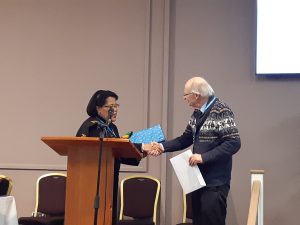
Day three
Session nine
Paper B1: Children and Youth Work – formal ministry for children’s and youth work
The Revd Paul Robinson, Convenor, introduced the resolutions from the Children’s and Youth Work Committee (CYWC) which sought to hear the views of Assembly Executive on potential sources of funding for the establishment of a formal ministry for children’s, youth and/or family. There were two options initially provoking discussion: sources within the M&M budget or sources from the wider URC family and beyond.
This new, commissioned ministry was proposed to complement existing ministry deployable to serve the denomination. Other denominations, Paul shared, are exploring how to recognise and increase the number of those serving this type of ministry,
In 2023, General Assembly passed a series of resolutions recognising the work in local churches amongst children, young people and families; acknowledging the ministry of Children’s, Youth and Family Leaders in local churches; and directing the mind of the Church towards a formal ministry of URC Children’s, Youth and/or Family Minister.
Since last July, the committee has held many consultations, looked at theological considerations, the different types of ministry in the URC – ordained, commissioned, accredited and recognised ministry – and came up with three options. ~
There was support for all three different options about the nature of the ministry, but an increasing level of support for an option to create a new category of ministry that is parallel to an existing form of ministry – eg Church Related Community Workers (CRCW).
This might be a commissioned ministry, with stipendiary and non-stipendiary options, to follow a parallel path to CRCW ministry in terms of assessment of call, training and placements and deployment.
The committee asked for Assembly Executive’s view on the proposals in breakout groups. Paul Robinson shared feedback from the groups including questions about the other options being explored, and collaboration with CRCWs, Education and Learning and Ministries.
When the resolution was discussed, John Bradbury clarified that the resolution is seeking the direction of travel that the committee would follow for its work before the General Assembly – which funding model would best support this work.
Nicola Furley-Smith said the financing was going to be difficult unless it was contained within existing ministry and MoM, a view echoed by Fran Kissack, and Nicola also warned of going into an apprenticeship model.
Sal Bateman asked if this was really needed, given some of the other conversations about finance and ministry at the meeting. She wondered if this was the right time in the decision-making process.
JB assured the meeting that this resolution sought guidance, and that General Assembly would have the full options available with the funding model when presented in July.
Chris Atherton said that there are significant sums of money available outside of the URC for this work. Dave Coaker asked if looking at employing youth workers sustainably could be a better option.
Alan Yates, Treasurer, and Clare Downing, said that the two funding options weren’t mutually exclusive. Alan said he was also prepared to work with CYW Committee before the resolutions for General Assembly were put together.
The committee withdrew the resolution after hearing the feedback, which Paul Robinson said would be used in the next part of this work.
Assembly Executive 2024 ended with worship led by Karen Campbell, and the Revd Stephen Ansa-Addo, Chaplains to the Revd Dr Tessa Henry Robinson.
Reporting team: Ann-Marie Nye, Laurence Waring, Stephen Tomkins and Andy Jackson.

